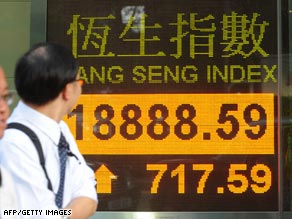
China moved closer to its goal of 8 percent annual growth, as the nation recorded a record jump in foreign currency reserves.
China’s foreign exchange reserves hit a record $2.13 trillion at the end of June, according to the People’s Bank of China. The world’s largest holder of foreign cash — mostly U.S. treasury bills — China’s reserves grew by nearly $180 billion last quarter — $42.1 billion alone in the month of June, a $30 billion increase from same time period last year Separately, the Chinese economy grew by 7.1 percent so far this year; the nation’s GDP grew 7.9 percent alone in the April to June quarter. That’s close to the government’s target rate of 8 percent — an auspicious number in Chinese culture. “It doesn’t surprise me because it does have such a strong cultural significance and it was indeed a target they have set in the past in the 1990s,” said Frederic Neumann, senior Asia economist for HSBC. “Whenever the economy is in trouble then the government reiterates this as a particular growth goal. Remember confidence and perception plays a big role in macroeconomic management.” Eight percent also is a key rate in order to preserve “social order” — which in China means jobs, economists say. “Eight percent means job creation. And while the Chinese economy is in better shape than many other parts of the world, China doesn’t have a social safety net,” said Dong Tao, economist for Credit Suisse. “So job creation is absolutely critical. What China really needs is to create enough jobs to keep its society calm.” Some analysts are worried the economy is being propped by its $585 billion stimulus package.
Don’t Miss
U.S. official: China arrests of ‘great concern
China eases restrictions on flotations
U.S., EU file WTO complaints against China
“If you look at very narrow indicators, it looks quite good. Real estate prices are going up, (the) stock market is shooting up,” said Peking University’s Michael Pettis, an expert on China’s financial markets. “Growth is much higher than expected but then when you try to figure out why all of that happened, you become very, very nervous.” Particularly troubling for some is the record rate of lending in China, which some market watchers fear could fuel speculation and create asset bubbles. Lending for the first half of the year in China was 7.4 trillion yuan (US$1 trillion).